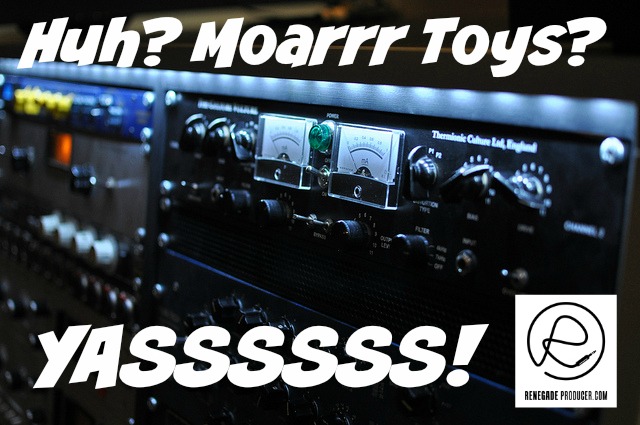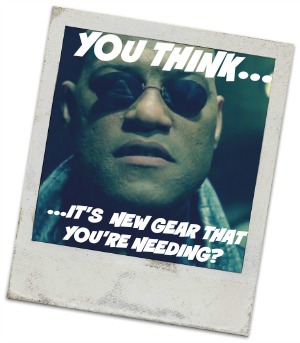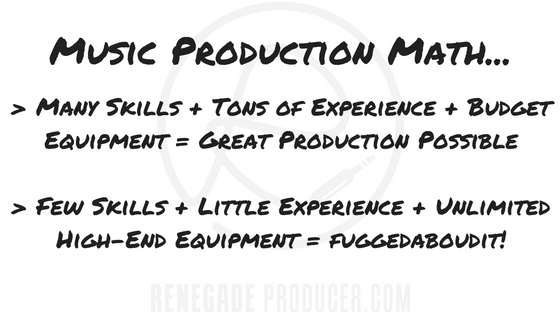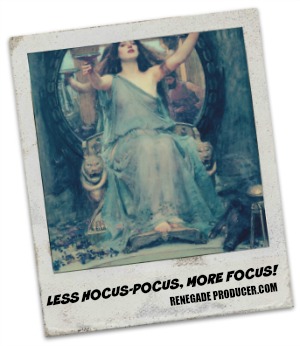25-step music production process checklist and video workshop >>>
The Music Production Equipment Reality Check
What music production equipment manufacturers and retailers don't want us to know...

Derivative of image by simon_music Flickr
I'm sure you have a music production equipment wish-list. I mean, let's face it, we music producers and musicians love ourselves some new studio toys, don't we? From the minimalist producer to the full-on gear-junkie, we all have at least one new piece of gear that we would love to add to our production bag-of-tricks.
Now, it's perfectly natural to want great gear. New music production equipment can however at times seem like a magic silver bullet that will get you to the better sound you want. This belief can lead you down a long dark rabbit-hole that ends in disappointment.
Fact: Music production today requires very little equipment.
You can right now produce professional radio-ready tracks all in-the-box with only a laptop with a DAW installed, a decent audio interface and a pair of studio monitors. It won't be as easy as doing it in a top-quality pro studio with tons of shiny outboard gear but, with the right skills, it's possible to do.
Music production equipment manufacturers and retailers can however make it seem as if you absolutely cannot make good music without the new piece of gear they've just brought to the market. Like you'll be stuck in the dark ages if you don't get it. OK, maybe that's a bit over-dramatic but the truth remains:
Gear manufacturers and retailers spend a ton of money and time every day to make you buy their latest releases.
Example: One full-page ad in a certain big music production magazine, whose name we won't mention, for example costs about $20,000 per year. I counted 57 full-page ads in one issue of said magazine. That would mean about $1,14 million is spent by equipment manufacturers and retailers every year on full-page ads in just this one publication. Others buy more expensive double-page spreads and many others buy half-page and smaller ad-types.
That's just for one major music magazine of the many out there!
The manufacturers and retailers also
sponsor audio and music professionals and industry events for greater exposure. They further spend more and more on digital channels such as
Google Adwords, Facebook Ads, Twitter Ads and Podcast and Blog sponsorship programs.
The
exact numbers aren't important. The thing we need to realize is that
there are brilliant advertising wizards who work day and night to
create glittery glamorous ads with one purpose; to convince you and me to
buy the products of the companies they work for.
The companies then use the advertising and branding platforms I mentioned above to get the ads in front of OUR eyeballs.
We should never underestimate the power advertising and branding exercises over our buying behaviour. Even the most seasoned advertising professionals can be programmed to behave a certain way. Just watch Derren Brown demonstrate this subliminal trickery in action in this video below...
If these evil geniuses can be manipulated, so can we. We must see through the glamour and understand the forces at work and the game that's being played. This will help us make the right choices when we spend money on music production equipment, rather than buying under the influence.
Note: I'm in no way knocking the music production
equipment manufacturers and retailers. They're just hustling like the
rest of us. I mean if you started a company that makes studio gear you would
advertise and market your products too, right? It's not an evil
world-domination conspiracy, it's just the way business works. You
have a great product to sell, you need to let people know.
The thing for us as music producers, artists and audio engineers to realize however is that what the companies want us to do doesn't in most cases align with our own specific individual interests at any given moment.
So how do we navigate these treacherous music production equipment waters?
It's easy to make these mistakes, especially when you are new to music production...
Mistake #1: Thinking the expensive new gear will make a massive difference
Here's the obvious but crucial thing to remember...
It's the ear, not the gear!
So, fine, expensive gear makes a massive difference when used by an experienced engineer or producer.
A
seasoned audio engineer or producer can get a decent sound in a studio
with budget gear. It may take a bit more work and creative
problem-solving to hack the production but they will usually be able to make it work.

You can hand over the
keys to Abbey Road or Sound City to the inexperienced engineer, give
them free unlimited music production equipment rentals, and they will most likely
struggle to produce anything good without some help.
This can be mathematically expressed like so...

Ask yourself: "Do I really need the expensive new studio toy or is more rubber-meets-the-road studio experience what's called for?"
I'd bet my savings that in most cases what's needed is more graft and not more gear.
Mistake #2: Just buying what your idols or other pros use
You
watch Dave Pensado interview your favourite artist, engineer or
producer. You see the gear, you see them getting all passionate about
certain pieces of music production equipment. Some
variation of this thought comes to your mind...
"That's exactly what I need to sound better!"
or
"That's THE secret!"
This
reminds me of a news interview I saw the other day of a guy who has
spent tens of thousands on surgery to make himself look like the famous
footballer, David Beckham.
This poor man spent all that money,
went through all that surgery and even if he does succeed, which seems
unlikely judging by his progress at the time of the interview, he will
never be anything more than a bad copy of his idol. An artist has to find their own voice. A producer needs to find their own sound.
Your
equipment choices will affect your sound. It makes sense to then get the
equipment that really works for you rather than that which worked for
another artist, engineer or producer.
It's easy to just get what your idol uses. It works for them, it will work for me! Right? Well,
it might. You may however find it doesn't work for you and realize at
the same time that you can only get about a third of what you
originally paid for it when you try to sell it second-hand on eBay.
Don't be like the David Beckham clone-wannabe-guy when it comes to your studio!
Mistake #3: Just buying what other producers, artists, engineers or producers recommend without research
This is a mistake because...
... some will simply recommend gear they own, gear they've used or gear they've seen in their buddy's studio.
... others will recommend whatever they get sponsored to recommend as outlined in the sponsorship agreements they have with studio equipment manufacturers.
This is not to say that there's no such thing as a great recommendation. It's just unlikely that the person knows you and your situation well enough to recommend the exact right piece of kit for you.
So, new gear isn't always the answer. Trying to mimic other producers is a fool's game. So is blindly trusting gear recommendations.
What are we to do then?
See through the Magick! Break the spell! Banish the Gearlust!

We need to get clear on what we want to produce and do the research and
legwork to find the equipment that will help us get the sound we're
after. That means you have to figure out what works best for the music you want to produce. Granted, it's not the easy option but you greatly reduce your chances of
buyers remorse. More importantly, you create a studio that works for you
and gets you the sound you want.
Yes, your idol
or the pro you see in the interview is surrounded by expensive
equipment.
The most valuable thing is however invisible. It's the
knowledge and experience they have accumulated and are able to apply to
their productions.
Again, we're back to the importance of knowledge and experience. Where are you at?
Maybe it's better to think more Tonnmeister and less Musician's Friend.
Focus on racking up the invaluable hours making music and ignore the gearlust.
So, to wrap it all up:
There are strong forces with deep pockets at work to convince you that you lack some essential piece of kit in your studio. The way to counteract this magic is by getting clear about the music you want to create and doing your research to figure out what music production equipment you actually need to get the sound you want for your productions.
Do the research, read gear manuals, demo different pieces of kit, read the results of shoot-outs other people post and do your own comparisons of different options before you decide which one fits best into your studio.
There are of
course cases where new gear will make a difference but most of the time
it's our lack of experience, knowledge and skills that holds us back
rather than the absence of certain pieces of music production equipment
in our studio. The answer in this case is to learn more, work more and
experiment more in the studio.
I am in no way saying that you
should never buy expensive studio equipment. I have and will again buy
expensive kit and lord knows I want to design and build my own perfect
dream studio one day. One day when my skills, income and budget justifies and allows such spending.
High-end gear has it's place and purpose. You may even say it's essential for certain types of productions. You're never going to make an SM57 sound like a U87 and sometimes nothing but the U87 will do. It's about having the right tool for the job.
You want to just make sure you buy the music production equipment you really need when you really need it! Music production experience, studio skills, knowing your studio well. These things will always be more valuable than having new or expensive gear.


Learn to understand equalisers and frequencies to supercharge your mixing skills and get results, fast...

New producer? Learn everything you need to produce your first professional track right now...

Would you like to discover the simplest and easiest way to learn music theory as a music producer?
Share this post. Spread the knowledge so other producers can benefit too:
- Renegade Producer
- Home Studio
- Music Production Equipment
ⓘ Some pages contain affiliate links so I might earn a commission when you buy through my links. Thanks for your support! Learn more


